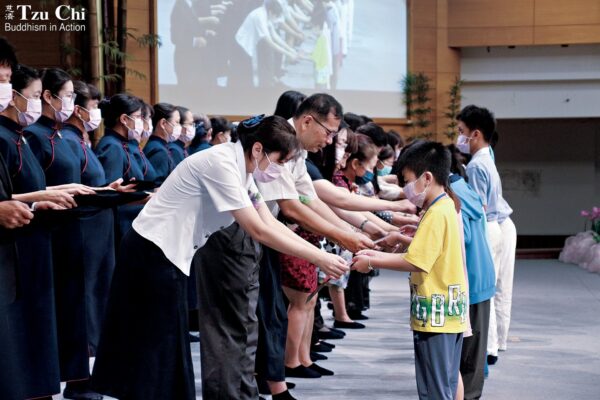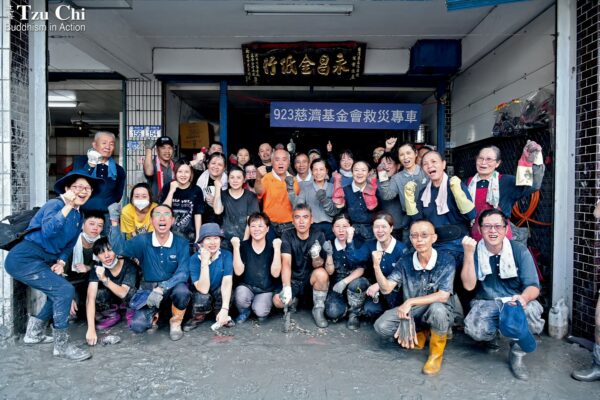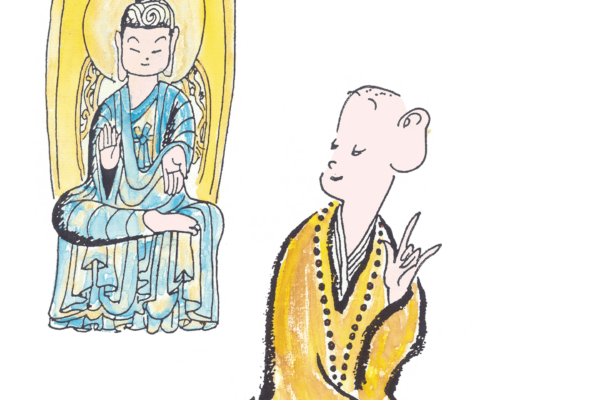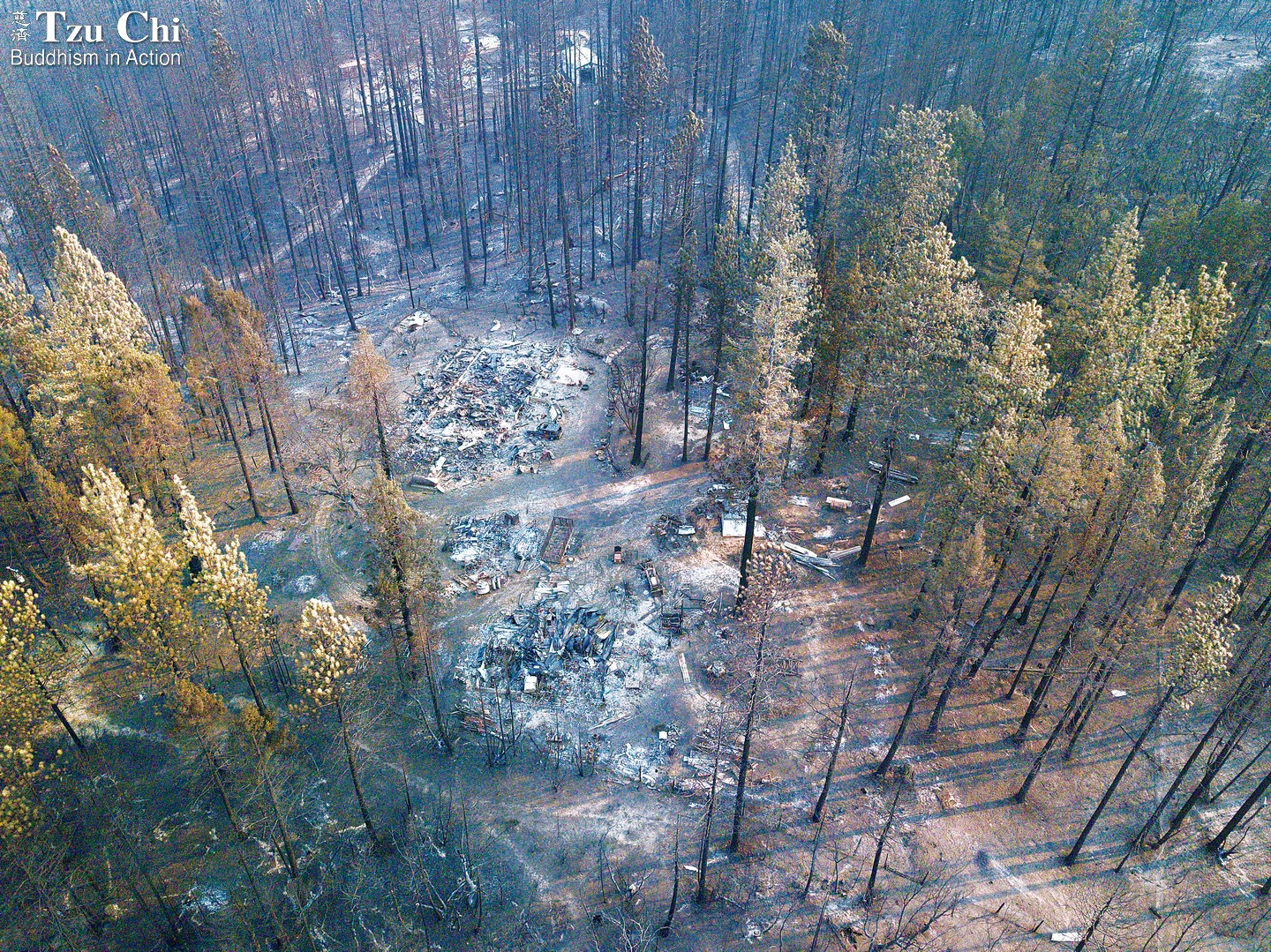
Woods and homes were burned down by wildfires that raged across Northern California earlier this year. LIU HAN-QING
The United States
Tzu Chi volunteers from Northern California provided emergency financial assistance to victims of the North Complex Fire from September 22 to October 9 at a local assistance center (LAC) set up at the Oroville Gymnastics Academy in Oroville, Butte County, California. The North Complex Fire is a massive wildfire that was started by lightning in Northern California on August 17, 2020. By October 27, the fire had burned an estimated 129,070 hectares (318,930 acres) and had been 96 percent contained. Aid distributed by Tzu Chi at the LAC included cash cards, blankets made from recycled plastic bottles, cloth masks, and instant rice and noodles.
Pat Cornelius was one of the victims helped by Tzu Chi. This was the second time he had received aid from the foundation. He was a survivor of the 2018 Camp Fire. He told Tzu Chi volunteer Baba Kauna Mujamal at the LAC that he had moved to the town of Paradise, Butte County, in 1974, and lived there for nearly 45 years before the Camp Fire destroyed his home. He received financial aid and a blanket from Tzu Chi in the aftermath of that fire. He remembered that before he left the distribution venue after obtaining his aid, a volunteer asked him if there was anything else they could do for him. He answered, “I need a hug.” Hearing that, four volunteers stepped forward at the same time and gave him a big hug. “You guys really do care,” Cornelius said to Mujamal, adding that he could tell that providing aid for evacuees like him was not just some sort of routine work for the volunteers. “You extend warmth out of your heart to people.”
Looking at the blankets Tzu Chi was distributing this time, he said, “This brings back many memories.”
Michael Putnam and his wife, Jennifer, came to the LAC on September 24. The couple was moved to tears when a volunteer read them a consolation letter from Dharma Master Cheng Yen for people affected by the wildfires. “Jesus and the Buddha must have been brothers,” Michael said. The couple were survivors of the Camp Fire, too. “We never expected we’d be experiencing the same thing again,” said Jennifer. Despite what they had suffered through, the couple said they were warmed by the foundation’s aid. They said they’d find a temporary place to stay after receiving the aid—any place that could shelter them from the elements would do. They declared that though they loved nature, they would not move back into the woods again. A forest might be a good place to vacation, they said, but it would no longer be fit for living there full time. They were not going to be driven from their home a third time.
Tears filled Sabrina Hopkins’s eyes as she listened to a volunteer read the Master’s consolation letter. She said she was deeply moved by the support, love, and care conveyed by the letter. “Thank you so much for your help,” she said. “I don’t know what we’d do without people like you to help us.” She took a Tzu Chi coin bank before she left and said she’d put her spare change in it to help the foundation aid the needy. She promised that when she was back on her feet, she’d do her best to pay back the love she had received from the foundation.
The forest fires might have laid people’s homes to waste, but love burned bright in the embers of the fires.
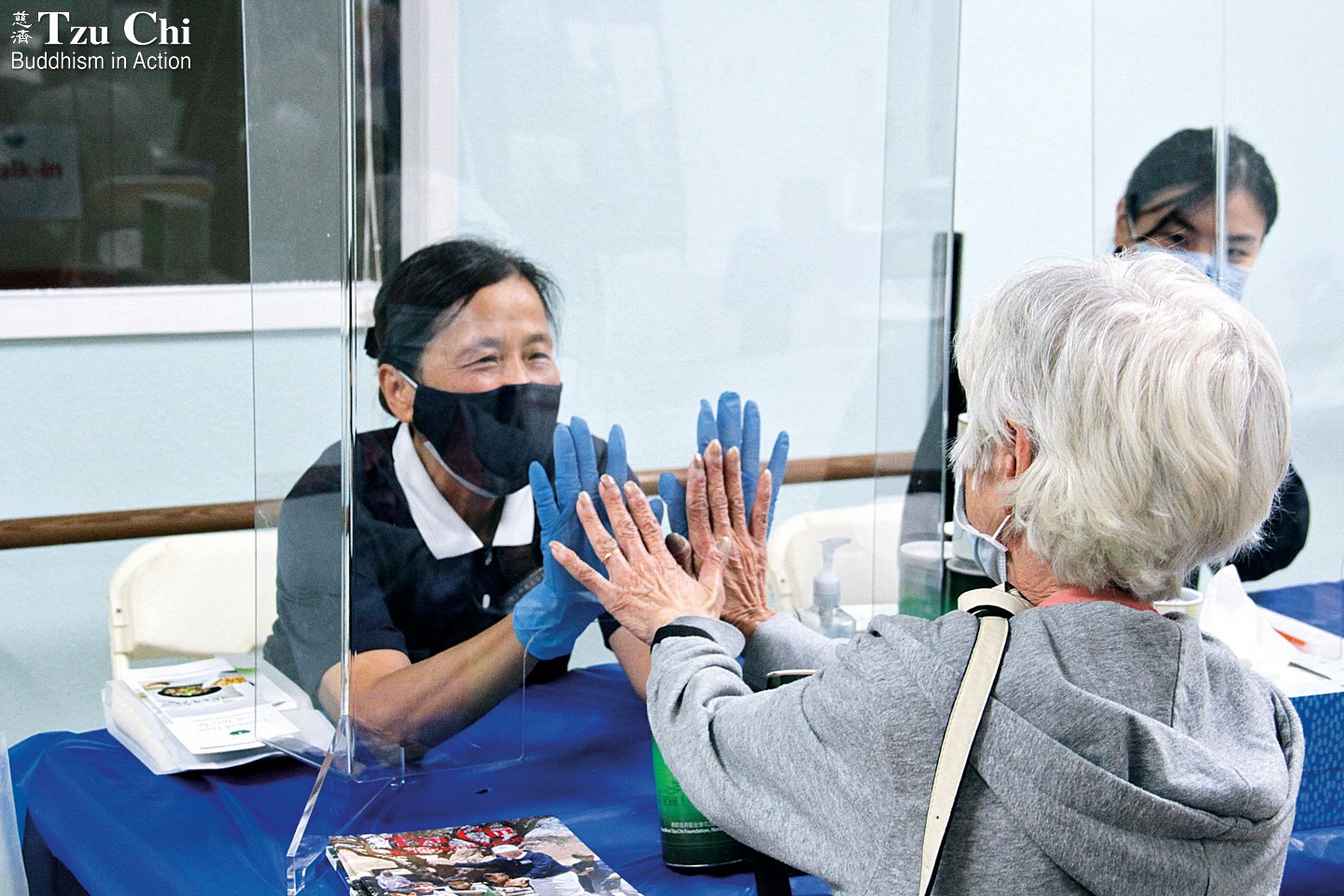
A Tzu Chi volunteer interacts with a victim of the North Complex Fire at a local assistance center set up at the Oroville Gymnastics Academy in Oroville, Butte County, California. LU WAN-JIE
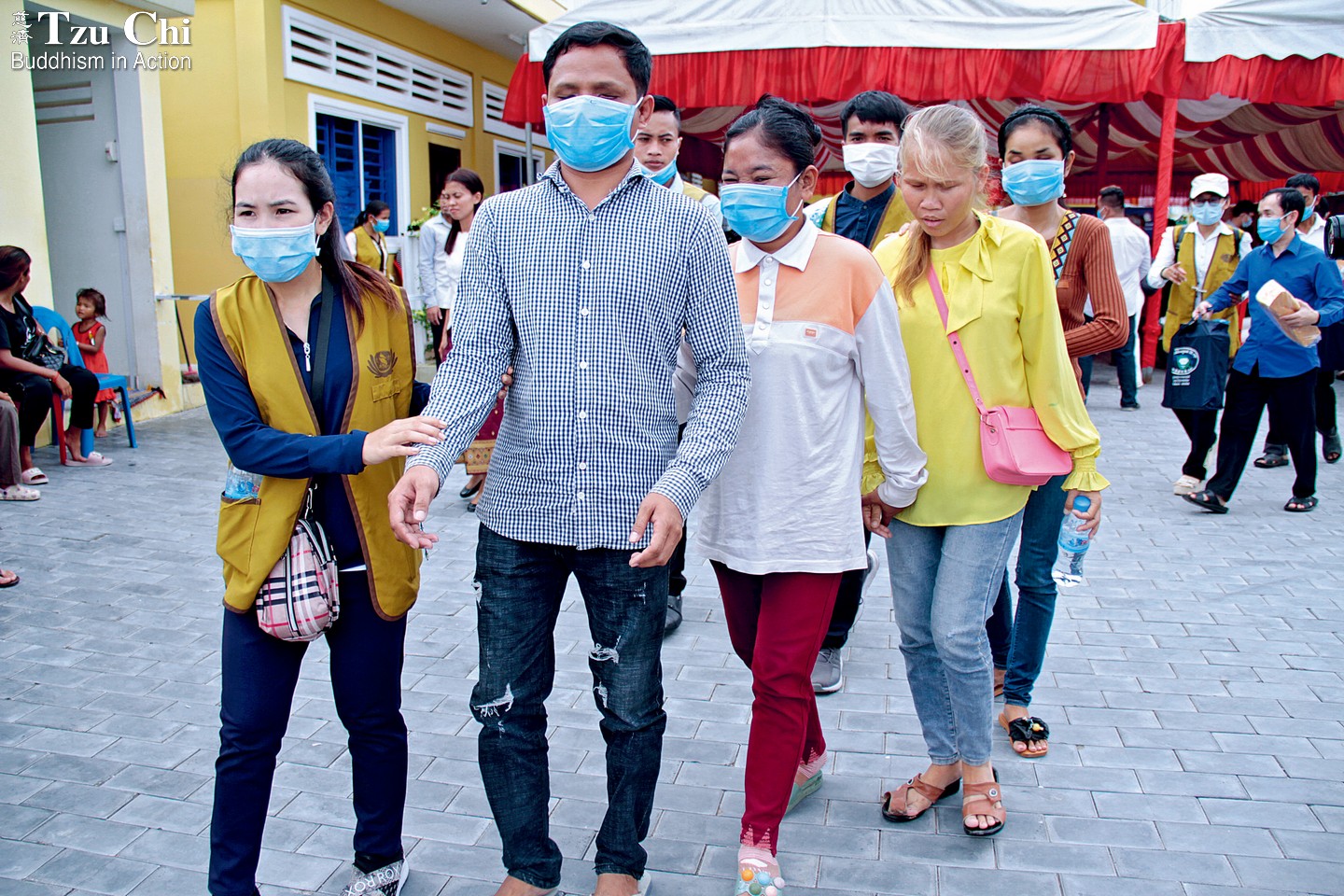
A volunteer helps guide a group of people with visual impairments at a distribution held by Tzu Chi Cambodia in Phnom Penh on October 11. The distribution was organized for people with disabilities to help them through the pandemic. HUANG SHU-ZHEN
Cambodia
Since the coronavirus pandemic broke out months ago, Tzu Chi Cambodia has been working to help soften the impact on local needy people. The branch office has now moved into its second phase of aid. In October, volunteers held three distributions for impoverished households, underprivileged university students, and people with disabilities to help them cope with this challenging time.
The first distribution was conducted on October 3 for 140 needy families in Chamkarmon, Phnom Penh, the national capital. Participating households received much needed supplies, including bread, rice, and solar panels. Some of the families didn’t have electricity at home, and others had difficulty affording it. The solar panels would help provide the families with illumination and improve their lives.
Theng Sothol, Chamkarmon district governor, complimented Tzu Chi for always working to serve people’s needs. “This was the second time after the pandemic that Tzu Chi distributed rice and other aid to needy families in Chamkarmon,” said the governor. “The solar panels will help reduce the families’ electric bills, which will be a great help to them.”
Sok Ang, one of the aid recipients, said: “My home is dark, and we really need lights to see. The solar panel will help us cut our energy costs. I’m really happy to receive it.”
Another distribution was conducted on October 10 for 387 university students from destitute families. The students received rice, noodles, and bread from the foundation. Vo Leak, one of the students, had come from out of town to study in Phnom Penh. “My family makes a living from farming,” she said. “It’s hard for us to get by. Thanks for Tzu Chi’s aid.” Ben Saream, another student, said, “It’s costly to eat out. We’ll be able to save a lot of money if we cook our own meals. I’m really grateful for Tzu Chi’s help.”
The following day, volunteers distributed more rice and other food to 485 people with disabilities. The foundation reached out to this group of people after the Musical Association of the Handicapped (MAH) sought Tzu Chi’s help via the welfare department of the Phnom Penh city government. It had been hard before the pandemic for this group of people to earn a livelihood, and the coronavirus just added insult to injury. After learning about their predicament, Tzu Chi Cambodia decided to provide them with three months’ aid. This distribution was the second one the foundation had held for these underserved people since the pandemic began.
Among the guests present at the event was Princess Jenna Norodom of Cambodia. She had learned about the distribution via Facebook and contacted Tzu Chi about attending in person.
After volunteers introduced Tzu Chi’s origin to the crowd and shared how even small sums of money, when pooled together, could make a big difference, people began generously depositing money into coin banks held out by volunteers. The young princess and guests from the government also donated to help the needy. Even aid recipients contributed what they could. Nav Chantharith, a visually impaired employee at MAH, said: “Tzu Chi reaches out to those in need around the world, including disabled people like us. They help make our lives better. I hope to pay their love forward by donating what I can to aid other needy people.”
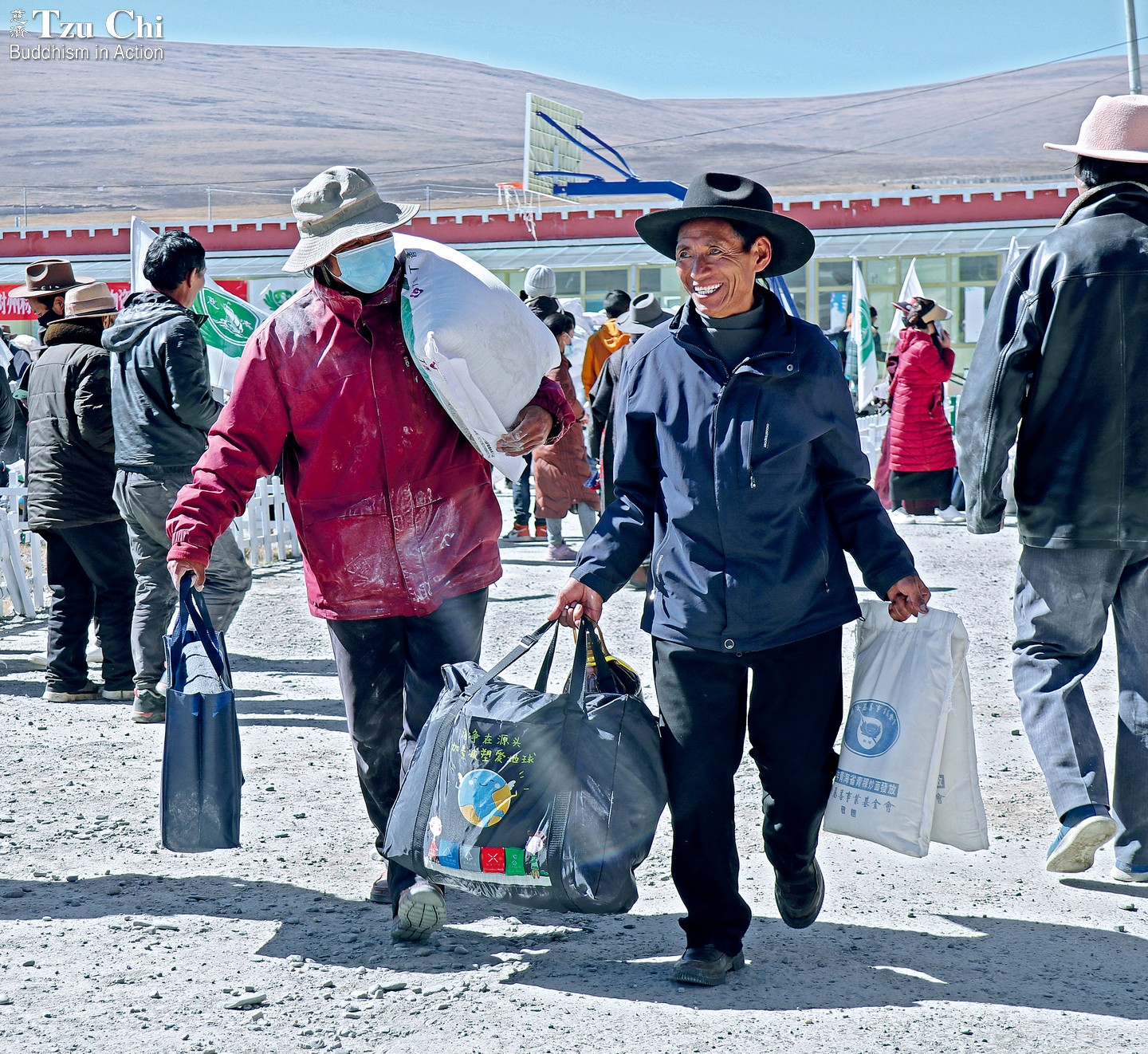
A Tzu Chi distribution was held on October 14 in Zhenqin, Yushu Prefecture, China, for 886 needy families. The supplies would help recipients through the cold winter months ahead. YE PING
China
On October 14, Tzu Chi volunteers from Sichuan and Qinghai Provinces conducted a winter distribution in the town of Zhenqin, Yushu Tibetan Autonomous Prefecture, Qinghai Province. Each family received nine items, including roasted barley flour, flour, cooking oil, blankets, jackets, and cotton underwear. In all, 886 needy families (3,083 people) received goods that day.
Volunteers began setting things up at the distribution venue when they arrived on the morning of October 14. They were helped by local people who had volunteered to serve during the event. Aid recipients who had arrived early also joined in to help. The locals’ assistance was important for the volunteers. The area sat at an elevation of 4,500 meters (14,763 feet), and it was beyond the volunteers, who lived at much lower elevations, to move the heavy supplies from a warehouse to the distribution site.
Volunteer Tang Guoliang (唐國梁), from Qinghai, said, “The winter arrives early in Qinghai. We started making purchases for this distribution in mid-September so we could put the supplies into the hands of local villagers before it began snowing in earnest.”
The event was kicked off right on time at 10:30. A local official thanked the Tzu Chi volunteers for coming a long way to the town to help the villagers. The harsh conditions of the area, such as a shortage of pastures for livestock to graze, have made it difficult for the locals to make a living. The official said the aid from the foundation would be a big help to the aid recipients.
Volunteer Wang Ping (王萍), from Sichuan Province, bustled around the venue helping in every way she could. “The high altitude has made me a little winded and my voice husky,” she said, “but I’m very joyful and full of energy.” She serves as a prime example of this saying: happiness is found in helping others.
A villager pointed to the Tzu Chi logo printed on a distribution notification letter and said that he and other villagers had received aid from the same organization 24 years ago.
“Thank you”—in Tibetan—was heard frequently at the venue as recipients expressed gratitude for the goods they had received. Though getting home with the heavy supplies was a little arduous, the thought of a well-supplied winter ahead made them smile.
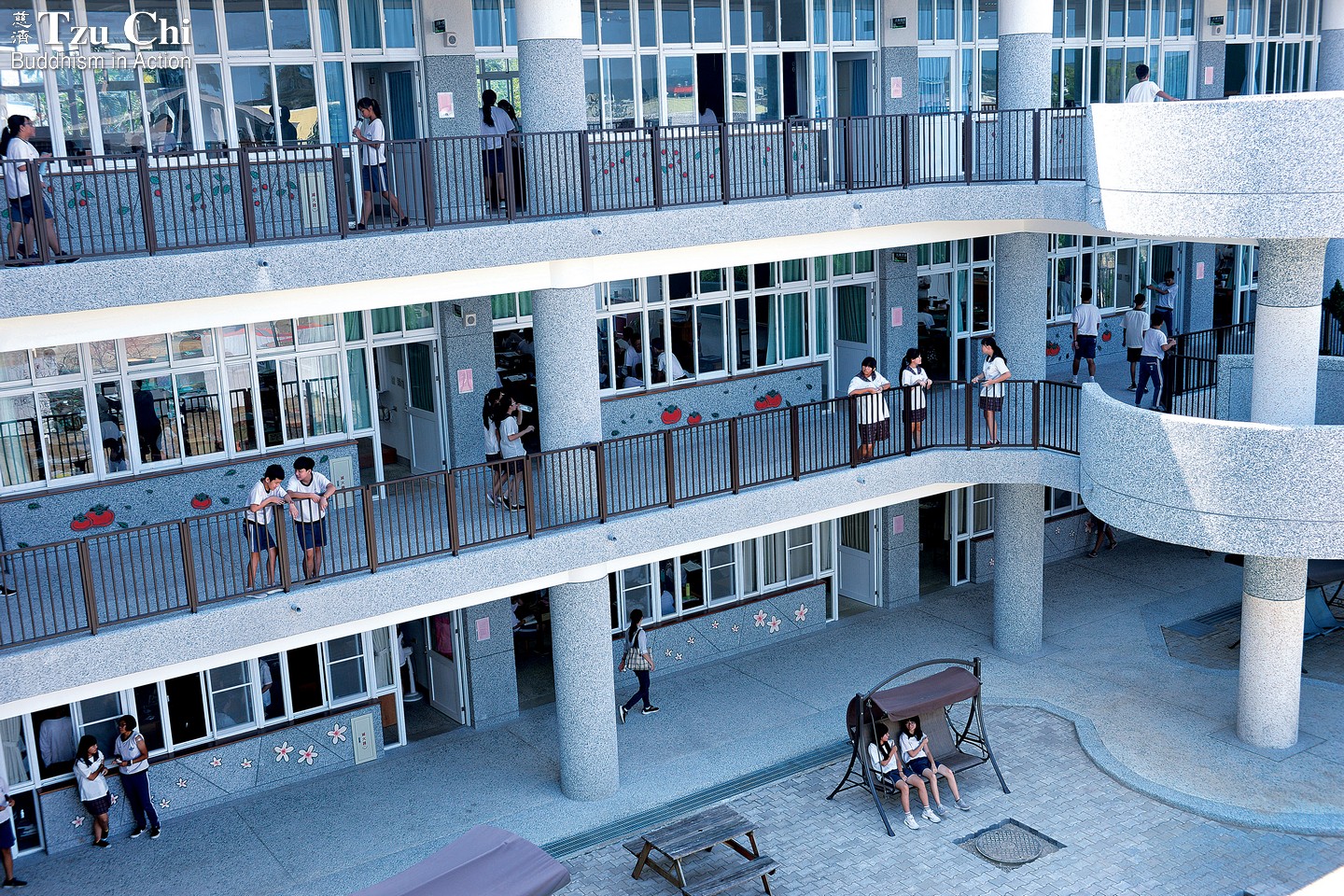
A scene at Gung Guan Junior High School in Miaoli County, northern Taiwan. Tzu Chi built four new buildings for the junior high that replaced old, unsafe buildings on campus. YAN LIN-ZHAO
Taiwan
An inauguration ceremony was held on October 20 for the new buildings that Tzu Chi constructed for Gung Guan Junior High School in Miaoli County. Gung Guan Junior High was one of the schools included in the foundation’s Project Disaster Reduction. This project was launched in 2014 to replace aged or damaged school buildings in Taiwan with new ones so that students could learn in safer, better environments.
Gung Guan Junior High was founded in 1946. After decades of use and wear and tear, the buildings at the school were no longer safe to use. Miaoli County Magistrate Hsu Yao-chang (徐耀昌) requested help from Tzu Chi to rebuild it. In response, the foundation sent a team to assess the condition of the school buildings. Based on their findings, Tzu Chi decided to finance the reconstruction of the school.
The reconstruction project included four new buildings with a total floor space of 9,541 square meters (102,698 sq feet). In addition to regular classrooms, the buildings house a library, office space for the teaching and administrative staffs, practice and ensemble rooms for the school’s music program students, as well as other facilities.
The new buildings are functional and strong, which is necessary given that Taiwan is prone to earthquakes. To ensure that the new buildings could withstand temblors of up to magnitude 7, architect Huang Jian-xing (黃建興) designed the buildings with reinforced exterior corridors and balconies with strong pillars. But such strength does not come at the expense of aesthetics. Another notable feature of Huang’s design was the incorporation of motifs reflecting the culture of the local community. For example, building walls were decorated with appealing images of tung blossoms, persimmons, and red dates—emblems representative of the local Hakka community.
During the inauguration ceremony, school principal Fang Li-ping (方麗萍) thanked architect Huang for designing the strong, beautiful buildings for the school, the Miaoli county government for providing support, and the contractors for pulling out all the stops to finish the project as soon as possible. She thanked Tzu Chi construction commissioners for visiting the school every month to inspect the buildings under construction to ensure the quality of the workmanship. Finally, she thanked Tzu Chi volunteers and the Parents Association for extending support and care to the school’s students and staff.
The entire project took two and a half years to complete and cost over 230 million Taiwanese dollars (US$8,207,100). In Miaoli County alone, Tzu Chi has helped construct new buildings for four schools under its Project Disaster Reduction. Of those four schools, only one remains to be completed.
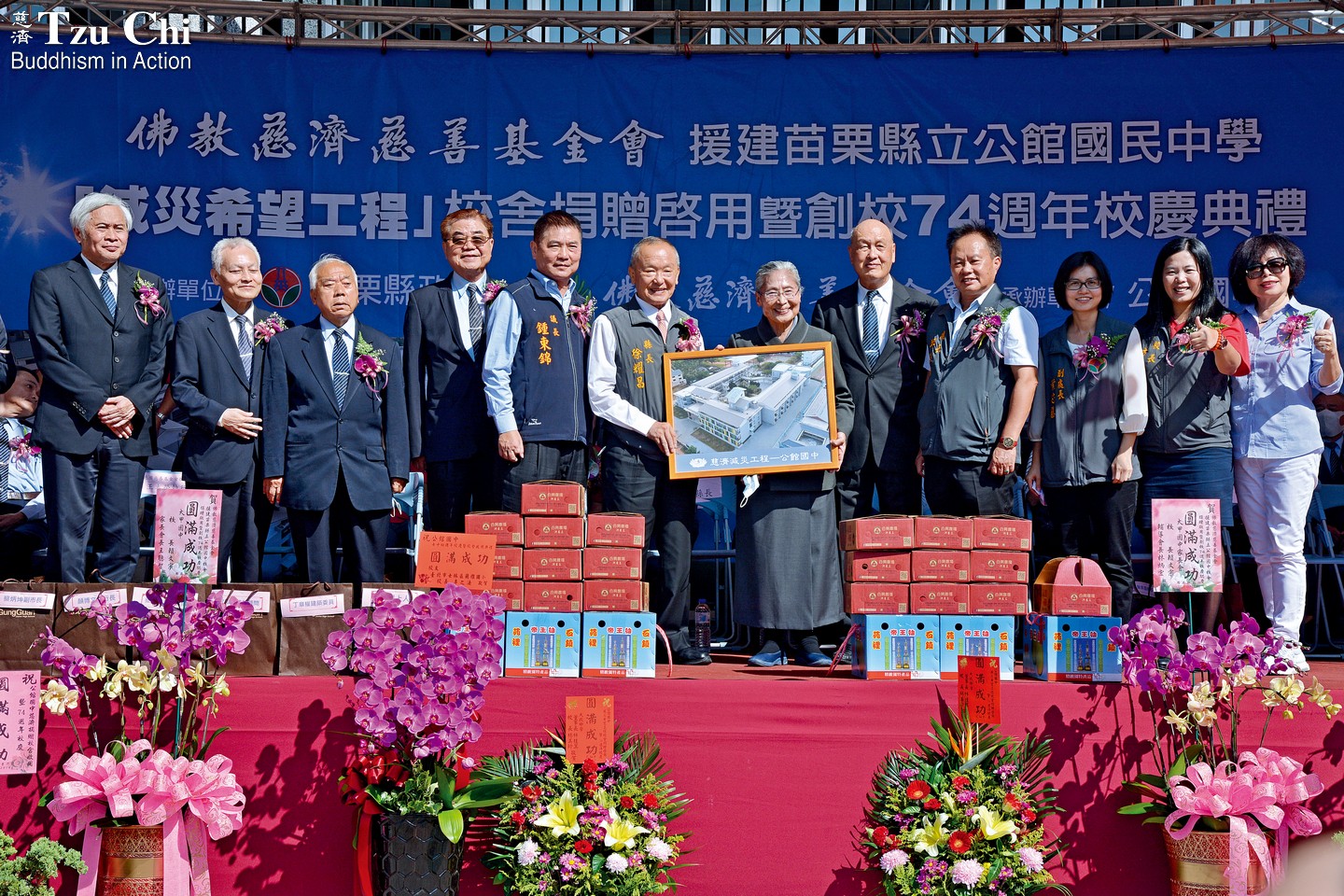
An inauguration ceremony for the new buildings at Gung Guan Junior High School took place on October 20. YAN REN-PENG
The United Kingdom
Wearing a face covering in shops and supermarkets in England became compulsory on July 24. When schools reopened in September, students over 11 years old were also required to wear face coverings in corridors and communal areas. These restrictions were intended to protect people from the coronavirus, but they further strained the supply of masks in England. Tzu Chi volunteers have been doing what they can to help.
Britain began suffering from a mask shortage as early as March. To help relieve the shortage, Tzu Chi volunteers in the country began making cloth masks at home and giving them away to help protect community residents from the virus. Volunteer Wang Su-zhen (王素真) of Malvern, Worcestershire, not only made masks to give away, but she also created an instructional video and provided materials for mask-making. Her thoughtful actions allowed more people to join in to help make masks and relieve the shortage.
Ms. Su of Manchester has been volunteering for Tzu Chi for over a decade. Because of her poor health, she avoided going out during the pandemic and thus felt bad for not being able to do anything to help others during this time. When she learned that she could make masks to give away, she realized this was a good chance for her to give. In a few months’ time, she made over a thousand cloth masks for adults, children, and even toddlers less than three years old.
Many other volunteers and community residents joined in Tzu Chi’s mask-making effort, but they couldn’t keep up with the demand. Fortunately, the Qing Culture and Art Foundation in Taiwan donated more than 20,000 cloth masks to Tzu Chi Britain from May to July. Volunteers visited post offices, train stations, and shops, and, after obtaining permission from people in charge of these premises, placed supplies of masks on site for anyone who would need them. Volunteers also provided masks to street people, refugees, and hospital workers.
When schools in England reopened in September, students over 11 years old were required to wear masks in corridors and communal areas. Tzu Chi volunteers delivered masks to various schools so that school staff and students could be better protected. St Anne’s RC Primary School and St Vincent’s Schoolhouse in Manchester, Nascot Wood Junior School in Watford, Hertfordshire, and Glenthorne High School in Sutton, London, were among the schools that received masks from Tzu Chi.
On September 8, volunteers delivered 2,000 cloth masks to Glenthorne High School. The masks were received by Debby Austin, the school’s attendance officer. Austin told the volunteers that her school had 1,700 students and 400 teachers and administrative staffers, but the government had only provided two small boxes of masks and other personal protective equipment. Volunteers were happy to help the school better equip themselves for the coronavirus.
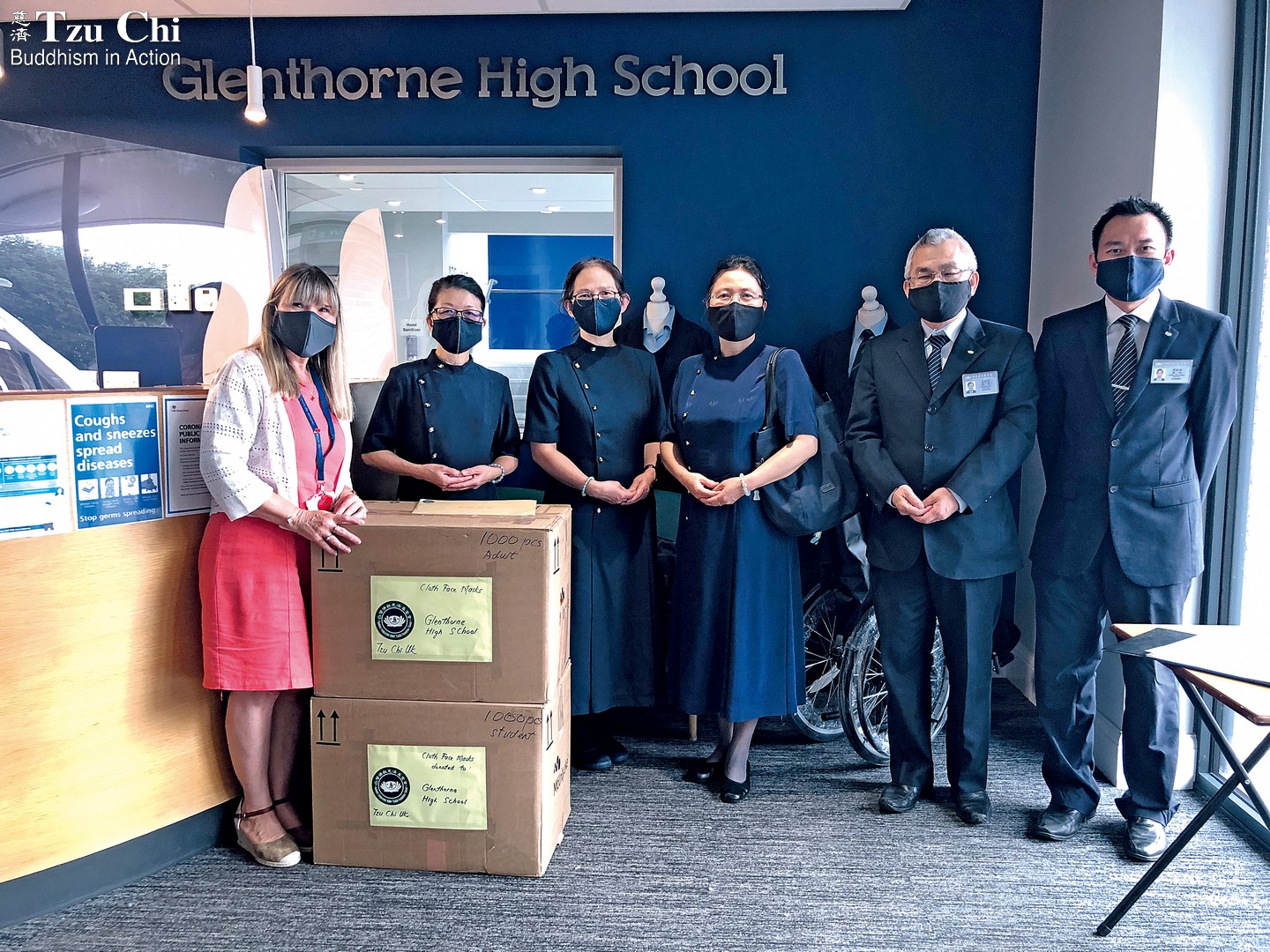
Tzu Chi volunteers delivered 2,000 cloth masks to Glenthorne High School on September 8 to help protect the school’s students and staffers from COVID-19. ANDREW BOGUE
Sri Lanka
Tzu Chi Sri Lanka held its second annual large-scale distributions for low-income families in September. Gift vouchers were handed out to nearly 5,000 families from September 18 to 28.
The distributions this year were originally slated to take place in April, but were postponed due to the coronavirus pandemic. As soon as the pandemic began to abate in the nation in August, volunteers applied to government authorities for permission to launch the distributions and obtained approval to do so.
The events this year were held at two Tzu Chi offices, one in Colombo and one in Hambantota. As a precautionary measure to prevent the spread of the coronavirus, volunteers spread the distributions in Colombo over six days and those in Hambantota over four days. Volunteers also scheduled morning and afternoon time slots for aid recipients to further stagger their arrivals and minimize the crowd. Each aid recipient, based on where they lived, was assigned a date and time slot during which they could come to the offices to obtain their vouchers. Attendees had to wear masks, submit to temperature checks, and have their hands sanitized before entering the distribution venues.
An aid recipient who came to a distribution at the Colombo office said that her family was too poor to afford even daily necessities, and the pandemic had just made things worse. It was a great solace to her to receive the gift vouchers from Tzu Chi.
Samanthi, a 38-year-old single parent of three children, volunteered at the distributions at the Hambantota office. Her husband had died in an accident in June 2016 on his way home from work. After the tragedy, her relatives provided her with financial assistance so that she could feed her children. The relatives’ aid, however, was insufficient to help her in the long run. She was referred to Tzu Chi for assistance, and became a long-term care recipient in 2018. Encouraged by Tzu Chi volunteers, she later began volunteering for the foundation to serve other needy people. She said she was greatly cheered by the smiles on attendees’ faces whenever she took part in a Tzu Chi event. She was content and grateful to be able to give to others.
Tzu Chi volunteers continued to serve recipients even beyond the distributions. Some of them accompanied elderly recipients to supermarkets to help them use their gift vouchers to purchase necessities. A man who had walked barefoot for two kilometers (1.2 miles) with the help of a walking stick to the distribution venue in Colombo told the volunteer who helped him out at a supermarket that he needed to plan his purchase with care so that the love from donors wouldn’t go to waste.
Every aid recipient left a distribution with a cheerful expression. Their happy smiles conveyed their gratitude to Tzu Chi.

